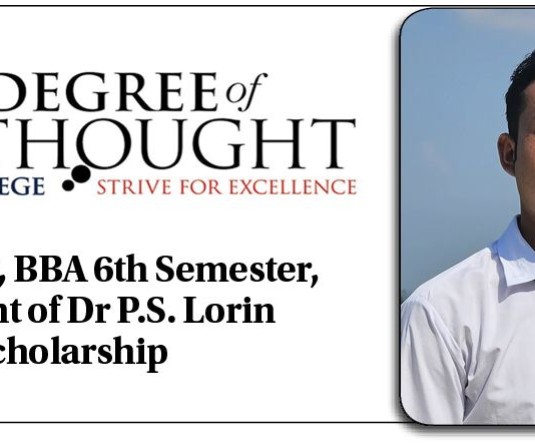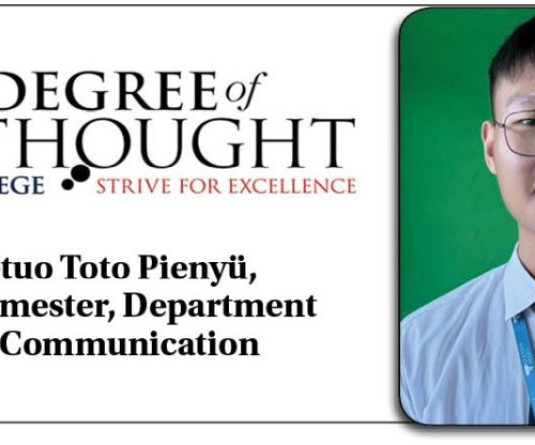
"True leadership is not about rising above others, but walking alongside them and lifting them with integrity and courage."
We blame leaders for failing, yet often enable it ourselves. Leadership isn’t just in offices or positions of power—it’s in homes, schools, churches, and communities. Wherever guidance is needed, leadership—and responsibility—exists. Too many leaders fall short today, and the impact of their failures resonates across generations.
History offers countless lessons, like the Roman Empire, once one of the most powerful civilisations in the world, which crumbled not merely under external invasions but also due to corruption, arrogance, and leaders who prioritised luxury and personal gain over public duty. In India, the freedom struggle succeeded not only because of numbers but because of the vision, sacrifice, and integrity of leaders like Gandhi, Nehru, and Patel. Their leadership was rooted in service and humility. Even in Nagaland, we remember elders and village leaders who held communities together with fairness, courage, and compassion, resolving disputes not for personal gain but for the welfare of all. These examples remind us that leadership is never about titles; it is about trust, accountability, and moral courage.
So why do leaders fail today? The reasons may vary, but the roots are the same. Leaders fail when honesty is replaced by convenience, when listening is replaced by commanding, when humility is replaced by pride, and when short-term gain outweighs long-term vision. In politics, this leads to corruption and public disillusionment. In churches, it can create division rather than unity. In classrooms, students lose role models. Even within families, when parents fail to model values and responsibility, children grow up confused, disconnected, and ill-prepared for the responsibilities of society. Yet the responsibility does not lie with leaders alone. As a society, we too contribute often silently to the failures we criticise. We complain about corruption, dishonesty, and misuse of power, yet in subtle ways, we sometimes enable the very patterns we condemn. Paying bribes “just to get things done,” bending rules for convenience, ignoring wrongdoing, or remaining passive in the face of injustice. These actions, seemingly small, slowly erode accountability and enable failure. Leadership does not exist in a vacuum; a leader cannot rise higher than the conscience of the people who follow them.
Consider the crisis of integrity. Across the world, leaders have fallen because personal ambition overshadowed ethical responsibility. We see brilliant people rise to positions of influence, but without character as their foundation, their leadership is shallow and unsustainable. Vision is another casualty. Leaders focused only on today’s applause, rather than tomorrow’s future, weaken institutions, break trust, and leave societies directionless. But these failures are not merely problems to be sad about; they are lessons. Leadership must be built on character, not charisma. Knowledge, skill, and talent are important, but without integrity, discipline and self-reflection, they are fragile. True leadership demands listening and hearing not just words, but the unspoken cries of the people, the concerns of the marginalised, and the wisdom of elders. Abraham Lincoln, one of history’s greatest leaders, surrounded himself with critics, not flatterers, understanding that listening prevents blind mistakes. Leaders who surround themselves with “yes men” fall into arrogance and eventual collapse.
Leadership is also about sacrifice. Mother Teresa had no title, yet her leadership came from service. Dr. APJ Abdul Kalam, “the people’s president,” is remembered not for power or luxury, but for humility, vision, and dedication to the nation. Leadership is about lifting others while remaining grounded, walking with people rather than standing above them. True leadership transcends position or wealth. It is measured by the lives we impact and the trust we inspire.
As a young person, I reflect on this not to condemn leaders, but to remind my generation of our responsibilities. Tomorrow, we will be administrators, educators, teachers, church leaders, village elders, and officers. If we chase titles without responsibility, power without principles, or ambition without service, we too will fail. But if we embrace integrity, humility, and discipline, we can restore faith in leadership and guide our communities toward progress and harmony.
Our society desperately needs leaders who unite rather than divide, who inspire hope rather than fear, and who act with courage and compassion. The failures we witness today should not discourage us; they should compel us to rise. Leadership is not about outshining others; it is about walking alongside them, lifting them, and building institutions that endure beyond personal ambition. Nagaland, like every society, stands at a crossroad. The next generation has a choice: inherit the weaknesses of failed leadership or rise above them to write a new story. The legacy of leadership is not just in positions held or policies made; it is in the trust built, the values upheld, and the lives improved.
The failures we see around us are not destiny, but lessons. Every choice we make, every action we take, plants a seed in the society we live in. If we act with honesty, courage, and care, we can quietly shape a better tomorrow. Leadership begins with responsibility, and responsibility begins with each of us. The path may be long and unseen by many, but those who commit to these principles will rise to guide, to protect, and to serve. Let us carry this responsibility not for recognition, but because it is needed, because it matters, and because one day those seeds will bear fruit.
Degree of Thought is a weekly community column initiated by Tetso College in partnership with The Morung Express. Degree of Thought will delve into the social, cultural, political and educational issues around us. The views expressed here do not reflect the opinion of the institution. Tetso College is a NAAC Accredited UGC recognised Commerce and Arts College. The editorial team includes Chubamenla, Asst. Professor Dept. of English and Rinsit Sareo, Asst. Manager, IT, Media & Communications. For feedback or comments please email: dot@tetsocollege.org






